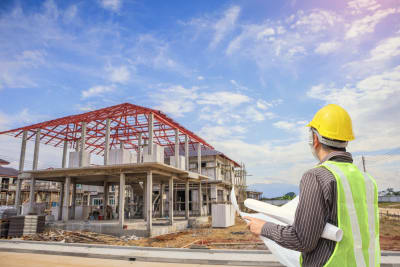Becoming a home and building inspector in Florida involves acquiring the significant training to perform your job duties to the highest possible level. To do so, however, there are a few things you must know, including some steps that have to be carried out before and after your official training.
In case this sounds overwhelming, rest assured it is not. Becoming a home and building inspector in Florida is straightforward and should take a little time.
Below we discuss everything you need to know to begin your journey, including dedicated sections on the possible alternatives to consider, licensing and certification requirements, areas of specialization, and more.
How to Become a Home and Building Inspector in Florida
The steps involved in becoming a home and building inspector in Florida are similar to those needed in most states, with a few exceptions.
We take a look at all of these below.
Step 1: Possess a High School Diploma or GED
Aspiring home and building inspectors in Florida must endeavor to get their high school diplomas or GED equivalent. This is needed to secure employment in a training program and also to become licensed down the road.
Step 2: Enroll in a Training Program or Acquire Training on the Job
Inspectors have to be trained to do their jobs. In some states, aspiring inspectors with prior experience in the construction field may opt to get their training on the job. In contrast, those without previous experience may train in a formal training program.
In Florida, however, the state mandates that all aspiring inspectors undergo a pre-training licensing course before they are allowed to practice professionally.
Step 3: Complete a Pre-License Course
Home and building inspectors in Florida have to be licensed to practice. To do so, they must sit for and pass an approved exam. They must complete a pre-license course with at least 120 hours of training instructions to apply for this exam.
The Florida Department of Business and Professional Regulation (DBPR) approves several online and offline courses. Still, each focuses on the same topics: home structure, interior and exterior components, roof covering, HVAC, and electrical systems, among others.
Step 4: Select an Approved Exam
After finishing the pre-licensing course, candidates must pass an exam to become licensed. The DBPR allows candidates to choose between four options in this regard. These are:
- National Home Inspector Examination - Offered by the Examination Board of Professional Home Inspectors ( EBPHI), this exam includes 200 multiple-choice questions and must be completed in 4 hours.
Candidates must sit for the exam in person. Examination fee varies by state.
- Florida Home Inspection Examination - Offered by the Florida Association of Building Inspectors (FABI), this exam includes 100 multiple-choice questions and must be completed in 2 hours.
The exam is available nationwide but must be taken offline at a proctored testing lab.
- Florida Home Inspector Licensing Examination - The Florida Home Inspector Licensing Examination is offered by the International Association of Certified Home Inspectors ( InterNACHI) and consists of 120 random questions from a pool of 360 multiple-choice questions.
The exam is available to members and non-members of the association.
- Certified Home and Property Inspector Examination - This exam is available through the Association of Construction Industry Certified Professionals (ACICP). The exam must be completed in two hours.
Step 5: Obtain Insurance
The DBPR also stipulates that all home inspectors in the state must be insured before obtaining their licenses and practicing professionally. Each inspector in the state must have commercial general liability insurance for at least $300,000.
Consider exploring trades with similar paths:
State License and Certifications
Once all the above steps are completed, candidates must only finish their application and pay the appropriate fees to be licensed. To finish the application, candidates may either submit their forms through the online portal or print out the application and have it delivered by mail.
Among other things, the application form must include proof of education and proof of examination. As for licensing fees, the exact figure tends to vary based on the application method.
Lastly, candidates must also complete a background check, including fingerprint verification, through a LiveScan provider.
Licensing must be maintained on July 31 every year through 14 hours of continuing education and renewal fee payment.
Top Home and Building Inspector Schools in Florida
Below are some of Florida’s most prominent home and building inspector schools offering high-quality education standards.
College of Central Florida
Ocala, FL Online + Campus
College of Central Florida offers pre-licensing training for future home inspectors in Florida. One of the highlights of this training program is that students get to immerse themselves in the craft by going through real-world simulations such as mock presentations.
Tuition
$2,832 - $10,632Contact
(352) 873-5800
cfinfo@cf.edu
Gold Coast Schools
Miami, FL Online + Campus
Gold Coast Schools is another destination to study as a future building and home inspector in Florida. Participants of this program will learn everything they need to carry out their jobs at a high level through several educational materials and workshops.
Tuition
$299 - $499Contact
(800) 732-9140
info@goldcoastschools.com
American Home Inspector Training
Online , FL Online Only
American Home Inspector Training is a popular destination with many established instructors for high-quality home inspector training. Students can practice what they have learned by visiting local homes and conducting real-world inspections before they graduate.
Tuition
$699 - $1,399Contact
(855) 493-0531
ahit@theceshop.com
Notable Mentions
Other top-quality destinations for home and building inspector training in Florida include the programs offered by:
- The International Association of Certified Home Inspectors,
- The Inspection Certificate Associate Training Program provided by the ITA,
- The ATI Training Home Inspection Institute and
- The Home Inspection School of Florida.
Explore home and building inspector schools by city:
Home and Building Inspector Salary and Job Outlook in Florida
The average annual salary for home and building inspectors in Florida is $54,174. This figure can get as high as $109,078 or as low as $26,906, depending on several factors such as location, experience, and employer.
Sarasota ($65,881), Jacksonville ($57,939), and Miami ($57,724) are the cities wherein inspectors earn the most annual average salary in the state.





